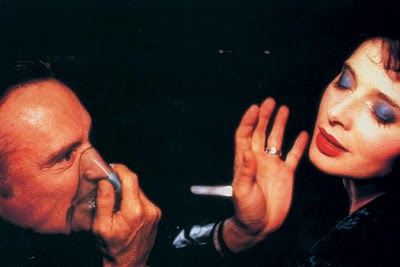I’m sure that no one with a computer is new to the sentiment ‘you can’t smile until you’ve learnt how to cry’, you’ve probably encountered its various forms in shitty chain-emails, or as a Facebook status from your 14 yr old cousin. What is that actually saying anyway? Most babies cry at birth, and start smiling voluntarily weeks later, so it’s not really getting at anything too profound in a literal sense. But in a new-age, spiritual, hippy, touchy-feely way, there’s something there. There’s a hint at the connection between pleasure and suffering. I don’t say ‘pain’, but suffering – a far richer understanding of what pain can be.
Dorothy Vallens (Blue Velvet, 1986) suffers. She suffers the abduction of her son and her husband. She suffers ritualistic rape. She suffers manipulation and psychological torture. She is a victim.
You want to be more like Dorothy Vallens? Are you a complete masochist? Well in response to those questions I’d say; Yes, I would like to be more like Dorothy Vallens, and no, I am not that much of a masochist.
No woman wants her beauty to be defined in purely physical terms, but that is not to say that she doesn’t want to be physically beautiful. Dorothy Vallens is undeniably beautiful. But this is not purely attributable to the physical beauty of Isabella Rossellini, or the saturated shooting of David Lynch. Dorothy is the femme fatale; she is vulnerable and wildly desirable, but impenetrable (not literally/physically). She needs and wants help, but she will not be won. She does not end up with Jeffrey (the man who liberates her from Frank), nor does she seem to want to be with him. Dorothy is a stunning woman, but what is so engaging about her is that there is so much more going on, and it’s right below the surface; she is forlorn, abused, talented, wicked, and she needs you – and everyone can tell. That’s a formidable presence.
Dorothy doesn’t simply suffer. Neither can it be said that she is a feisty heroine, Lara Croft-ing her way out of servitude. She is a victim, but she is not victimised by her victimhood. She grins a cracked-tooth grin as Frank slaps her, and she begs Jeffrey to hit her at the height of pleasure. She’s forced to sing, but she enjoys singing. It seems hard to say that she does not enjoy some elements of her abuse, or the attentions. And we can’t simply assume that it’s because of repeated abuse. We can’t assume that she didn’t enjoy a bit of S&M with Don – her husband, or that she never grabbed a mic before meeting Frank. Sure, she suffers at the hands of Frank – that is undeniable – but she doesn’t only suffer. She gets her kicks, even though she’s being used in the basest way.
Try pigeonholing Dorothy as just a dirty pro-bono prostitute. Nup. She’s a wife and mother, and cares desperately for her son and her husband. Don and ‘little Donny’ need her, as both mother and wife, but also as their safeguard, she must ‘stay alive for Van Goh’. And both Frank and Jeffrey need her. This woman is vital, in every role that women have been mythologised (yeah, okay, probably not as a virgin): mother, wife, whore, body, damsel in distress, martyr, obsession, dependant, Mata Hari, beauty, and muse.
Don’t get me wrong, I don’t want Frank Booth to gag me with a strip of blue velvet, and I don’t want to be sent my husband’s ear without his accompanying live body. I also don’t want to find Kyle MacLachlan in my wardrobe. I certainly do not see Dorothy Vallens as an ideal of what it is to be a woman (there is, of course, no such thing), nor do I see oppression and suffering as necessary to obtain womanhood. I would not like to be in Dorothy Vallens’ situation, but I would like to be more like Dorothy Vallens. Energy rumbling below the surface of a surreal/un-real woman who didn’t allow herself to be reduced to a body with no agency or self-determination; they may take her liberty and body, and determine her suffering, but they can’t take or determine her pleasure.
Post courtesy of Lauren Bertacchini
Picture Source:
http://4.bp.blogspot.com/_ZaK9jfSBxbI/TSvKfEBafRI/AAAAAAAADvs/Qw0OnY5S25Y/s1600/Beats-Per-Love-2.jpg
http://2.bp.blogspot.com/_I2i8xqihwqQ/TC6ZtSXwmOI/AAAAAAAAAV8/b7fm5Umg-HE/s400/blue-velvet.jpg


